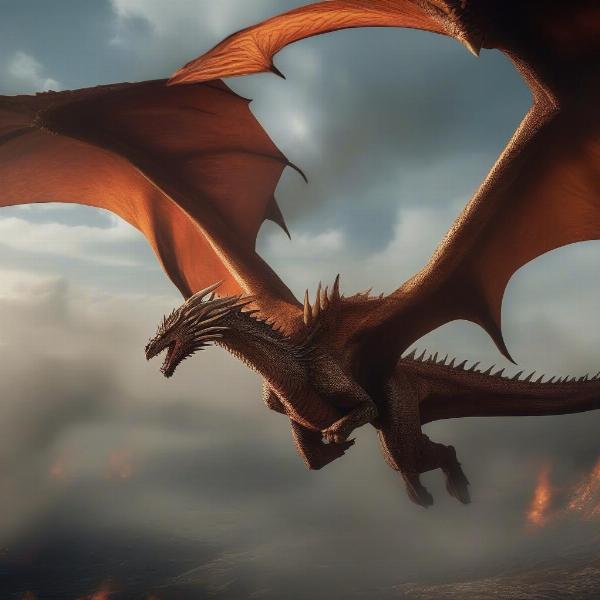Game of Thrones. The name itself evokes images of epic battles, political intrigue, and dragons soaring through the skies. But what does Game of Thrones actually mean? Beyond the literal interpretation of a contest for power in the fictional world of Westeros, the title carries deeper meanings, reflecting themes of ambition, betrayal, and the cyclical nature of history. This exploration delves into the multifaceted significance of “Game of Thrones,” examining its impact on popular culture and the enduring questions it raises about power, morality, and the human condition.
After the shocking conclusion of the HBO series, many fans are still pondering the true meaning behind the title. It’s more than just vying for the Iron Throne. It’s a game with countless players, each with their own motivations and strategies. The game represents the constant struggle for power, the shifting alliances, and the often brutal consequences that come with playing. It’s a game where even the smallest move can have devastating repercussions, and where victory is often fleeting.
Decoding the Game: Power, Politics, and Betrayal
The core of “Game of Thrones” revolves around the pursuit of power. Noble houses clash, individuals scheme, and entire kingdoms are thrown into chaos in the relentless quest for control. The Iron Throne, the ultimate symbol of power in Westeros, becomes the focal point of this struggle. But the game extends beyond the physical throne itself. It encompasses the intricate web of political maneuvering, the subtle betrayals, and the constant battle for influence that permeates every level of society. This complex interplay of power dynamics is what drives the narrative and keeps viewers captivated. For instance, the cunning strategies employed by characters like Littlefinger demonstrate the Machiavellian nature of the game, where manipulation and deceit are often the most effective tools.
Similar to how you might find out which house from game of thrones are you, the struggle for power determines one’s place in the hierarchy. Each house strives to advance its own agenda, often at the expense of others. This creates a volatile and unpredictable environment where alliances are easily broken and betrayals are commonplace. The game is not simply about winning the throne; it’s about survival, and the characters must constantly adapt and evolve to stay ahead of their rivals.
Beyond the Throne: The Human Cost of the Game
While the pursuit of power is a central theme, “Game of Thrones” also explores the human cost of this relentless game. The constant struggle for dominance takes a toll on the characters, both physically and emotionally. We witness the corruption of individuals consumed by ambition, the destruction of families caught in the crossfire, and the devastating consequences of war and betrayal. The show reminds us that even in a fantastical world filled with dragons and magic, the human condition remains fragile and vulnerable. The rise and fall of characters like Daenerys Targaryen, for example, highlights the seductive nature of power and the potential for even the most well-intentioned individuals to become corrupted by it.
The intricate storylines and complex character development in “Game of Thrones” have resonated with audiences worldwide. It’s a world where moral lines are blurred, and even the seemingly “good” characters are forced to make difficult choices that challenge their values. This exploration of morality and the complexities of human nature adds another layer of depth to the meaning of the title. It reminds us that the game is not always black and white, and that even the most noble intentions can lead to unintended consequences.
A Fortnight of Intrigue: Time and its Role in the Game
The passage of time plays a crucial role in the game, with events unfolding over years and even decades. This extended timeframe allows for the development of intricate plots, complex relationships, and the exploration of long-term consequences. Understanding the timeline of events, such as how long is a fortnight in game of thrones, can provide valuable insights into the strategic decisions made by the characters and the impact these decisions have on the overall narrative. This long-term perspective highlights the cyclical nature of power, as kingdoms rise and fall, and new players emerge to challenge the established order.
If you’re curious about which Game of Thrones character you might be, exploring the different personalities and motivations within the show can be a fascinating exercise. Each character embodies different aspects of the game, from the ruthless ambition of Cersei Lannister to the unwavering loyalty of Jon Snow. Identifying with a particular character can shed light on your own values and how you might navigate the challenges and complexities of the game.
The Legacy of Game of Thrones: Cultural Impact and Enduring Questions
“Game of Thrones” has left an indelible mark on popular culture, influencing everything from fashion and language to political discourse and social media. The show’s complex characters, intricate plots, and stunning visuals have captivated audiences around the world, sparking countless discussions and debates. The enduring popularity of “Game of Thrones” speaks to its ability to explore universal themes that resonate with viewers on a deeper level. It raises questions about the nature of power, the corrupting influence of ambition, and the human capacity for both great good and unspeakable evil.
“The true game isn’t for the throne, but for survival. Those who understand this are the ones who truly thrive in Westeros,” remarks Dr. Emilia Stone, a renowned fantasy literature scholar. The series challenges us to consider the choices we would make in such a high-stakes environment and to reflect on the consequences of our actions. It reminds us that even in a fictional world, the lessons about power, morality, and the human condition remain relevant and timeless.
 Dragons in Game of Thrones
Dragons in Game of Thrones
The Game Continues: What Lies Beyond the Finale?
Even after the series finale, the game continues in the hearts and minds of fans. Discussions, theories, and analyses continue to circulate online, demonstrating the lasting impact of the show. The world of Westeros, with its complex history and intriguing characters, continues to inspire fan fiction, artwork, and other creative endeavors. The game of thrones, in its many forms, is far from over. It lives on in the ongoing conversations, the passionate fan base, and the enduring questions it has raised about the human condition.
Conclusion: More Than Just a Game
“Game of Thrones” signifies more than just a struggle for a throne; it represents the complexities of human ambition, the cost of power, and the cyclical nature of history. The show’s lasting impact on popular culture and its continued relevance in discussions about power and morality demonstrate the enduring power of the Game of Thrones. It’s a game that continues to fascinate and provoke thought long after the final credits have rolled. What Does Game Of Thrones Mean to you?
FAQ
-
What is the main conflict in Game of Thrones?
The main conflict revolves around the struggle for control of the Iron Throne and dominion over Westeros. -
Why is Game of Thrones so popular?
Its complex characters, intricate plotlines, and stunning visuals, coupled with its exploration of universal themes like power and morality, contribute to its widespread appeal. -
What are the key themes of Game of Thrones?
Power, ambition, betrayal, family, duty, and the human cost of war are among the central themes. -
Is Game of Thrones based on a book?
Yes, it’s based on George R.R. Martin’s “A Song of Ice and Fire” series. -
What is the significance of the Iron Throne?
It symbolizes ultimate power and authority in Westeros, making it the focal point of the conflict. -
Who are the main families in Game of Thrones?
Stark, Lannister, Targaryen, Baratheon are some of the prominent families vying for power. -
What is the meaning behind the title “Game of Thrones”?
It refers to the complex political maneuvering and power struggles that dominate the narrative, highlighting the often brutal nature of the quest for the throne.

